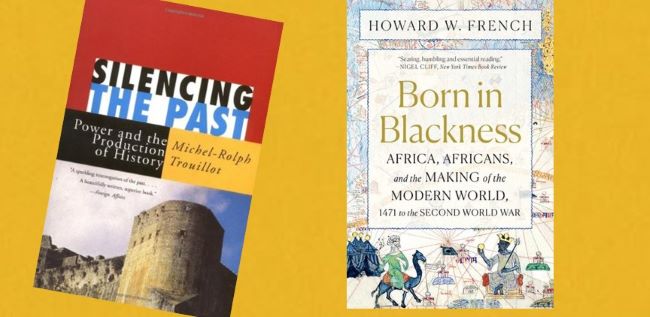2025
January 2: The Greatest 30 Years of Black Men Writing
2024
• December 23: Terms for novels by Black writers
• December 23: A Brief on São Tomé
• December 23: A Brief on African American Literary Data Work
• December 23: A Brief on Storm
• December 23: A Brief on Static Shock
• December 23: A Brief on Moon Girl
• December 23: A Memorable Scene from Sula
• December 10: The Greatest 25 Years of Black Women Writing
• December 5: A Brief on Miles Morales
• November 16: A Brief on Oprah Winfrey's Harpo Productions
• November 4: Adaptations of the Color Purple
• November 4: Adaptations of Black Panther
• November 4: Malcolm X and Man with the Shotgun, Part 1
• November 4: Malcolm X and Man with the Shotgun, Part 2
• November 4: Malcolm X and Man with the Shotgun, Part 3
• October 18: The phrase "African American Literary Studies"
• October 10: English majors and Career Preparation
• October 10: A Brief on Invisible Man
• August 10: The process of making a "Battle Royal" animatic
• July 18: Amiri Baraka and Black World
• July 9: "Battle Royal" Animatic
• July 5: The Big 7
• May 30: A Brief Timeline of Neo-slave Narratives
• May 14: Words of Fire animation
• April 18: Casting Viola Davis
• April 17: The Art and Artmaking of Kennedy Killion-Johnson
• April 17: Making a pair of Handcrafted Boots
• April 17: Animating action and transformation
• April 15: Reading Faces, Part 2
• April 15: Reading Faces, Part 1
• April 15: Black Book Dominos
• March 31: Hyphens & African American Novels
• February 28: Black Women Writers, 1970 - 1995
• February 22: Black Fiction and New York City, Part 2
• February 22: Black Fiction and New York City, Part 1
• February 13: Receptions of African American Novels
• February 6: Classifying Black Novels
2023
• December 8: The most magical thing that comes from reading fiction
• December 8: Reading fiction, endless possibilities
• December 8: from Toni Morrison's Beloved
• December 8: from Colson Whitehead's The Intuitionist
• August 13: Editions of Frederick Douglass's Narrative
• August 13: Frederick Douglass, Aunt Hester, and the Narrative
• June 28: When collegiate black men read short stories
• May 6: A Pertinent Question by Frederick Douglass
• May 6: When Eugene B. Redmond wondered about the meaning of a black poem
• May 6: Sierra Taylor on language skills
• May 6: Victoria Lefler on dance and storytelling
• April 21: Jetpacks & the Spivey production
• April 14: Casting Bias
• April 14: Casting Cora
• April 5: Casting across black diaspora
• April 5: Preparing questions for Dometi Pongo
• April 5: When Dometi Pongo was a student at SIUE
• February 15: Bad Men: Creative Touchstones of Black Writers
• January 31: William J. Harris, the poet as sketch artist
• January 30: "The Beauty of Bareness" by William J. Harris
• January 30: An artist who supports the arts
2022
• December 2: HBW's Novel Collection• October 25: Black poetry and African American anthologies of the 1960s and 1970
• October 25: The circulation of Claude McKay's "If We Must Die"
• October 25: The circulation of Langston Hughes's "Mother to Son" (updated)
• October 24: African American literature & Vocabulary
• October 19: Hughes and Harper at Spelman
• October 17: The circulation of Langston Hughes's "Mother to Son" (initial version)
• October 17: Langston Hughes's new birth year
• October 14: The circulation of Gwendolyn Brooks's "We Real Cool"
• October 14: The circulation of Margaret Walker's "For My People"
• October 10: A brief visual take on Trudier Harris’s Prolific Scholarship on African American Novels
• October 9: The circulation of Langston Hughes's "The Negro Speaks of Rivers"
• June 15: Remarkable Receptions podcast trailer
• May 19: Black Scholar Experience
• May 7: Frederick Douglass and photographs
• March 23: Reading Frederick Douglass's Narrative
• March 18: From Jay-Z to 99 Novels
• March 17: Black Literature Network
2020
• April 30: Project FAME
• April 29: Project GAME
2019
• November 6: Collages by Joshua White (East St. Louis postcards)
• November 6: City Parks (East St. Louis postcards)
• November 6: Bridges (East St. Louis postcards)
Related:







